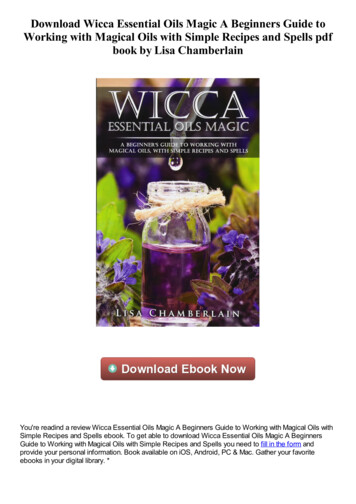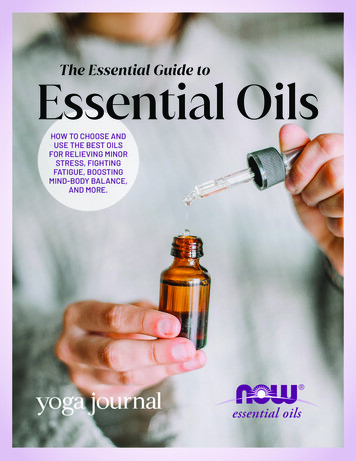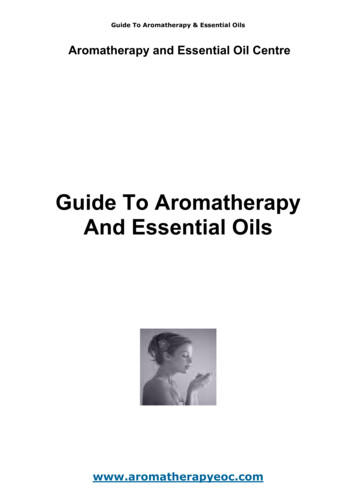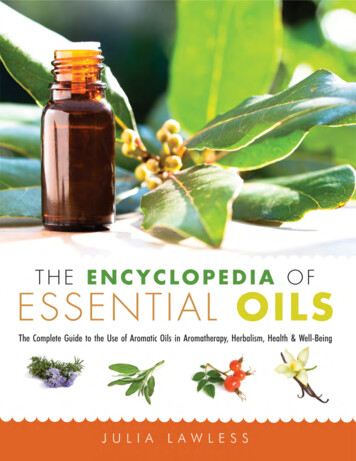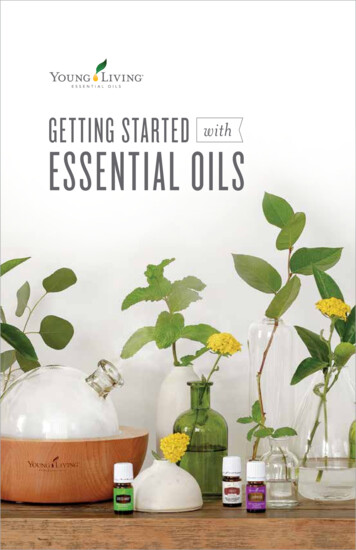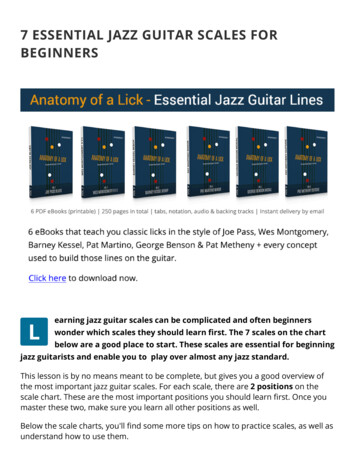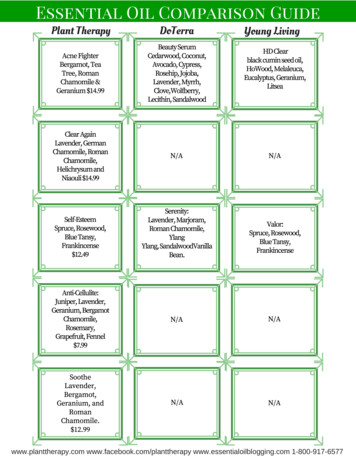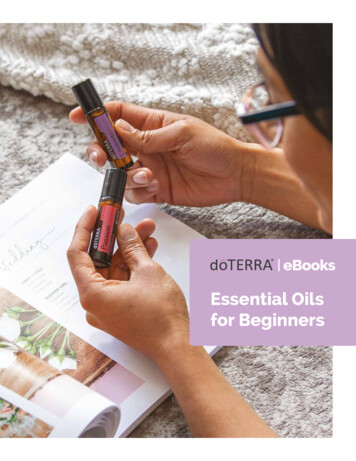
Transcription
Essential Oilsfor Beginners
Essential Oils for BeginnersIntroductionThe Power ofthe Entire Earthin One BottleOur planet is a complicatedsystem, made up of intricateecosystems, endless molecules,and powerful elements.Over the span of 4.5 billion years, the Earth has formedcolossal mountains, green valleys, leafy jungles, and vastforests, providing a home for countless plants and animals.On the 196,900,000 square miles of the planet’s surface,scientists estimate that there are 390,000 plants—with newspecies being discovered all the time.The hundreds of thousands of plants actually perform anumber of important functions for the planet. Plants helpcontrol the climate, process carbon dioxide and releaseoxygen into the air to help us breathe, keep living organismsalive, and can be used for food and health solutions, amongmany other practical uses.With so many benefits, it is nosurprise that plants have been usedsince the beginning of time to helphumans perform everyday tasks.2
Essential Oils for BeginnersAncient timesPeople of ancient civilizations used entireplants, extracts, and various plant parts tomake life easier, transforming the gifts ofthe earth into everything from textiles toremedies. Ancient people believed that theearth gave them everything they needed tosolve all of their problems.Present dayFast-forward to modern day. Plants arestill everywhere around us, yet with newinventions and technology, we’ve grownaccustomed to using synthetic productsrather than the gifts of nature to solveeveryday challenges. Technology has madelife easier, but along with technologicaladvancements, we’ve seen a decline in manyareas of quality of life.In our modern, industrial world, we’re exposed to a variety of toxinsin our daily lives through pollution, personal hygiene products,cleaning agents, and even our own food. Because of these highlevels of toxin exposure, we have turned to equally syntheticanswers for our health problems.3
Essential Oils for BeginnersAnnual global healthcarespending is anticipated to reach 8.7 trillionby the year 20201Despite the money that’s spent in thepursuit of health, many of us are not trulybetter off. Research shows that, whilethe United States spends more thanother countries on healthcare, the nationstill ranks low for mortality and lifeexpectancy indicators when comparedto other countries.2New research and technological advances aren’t all bad, of course.Thanks to innovation and technology, we’ve been able to harness thepower of nature to help us solve some of our problems—and we’re nowable to do it more safely and effectively than any generation before.Though it has become the norm, we don’t need to turnto synthetic chemicals to improve our lives or solve ourproblems. We can use what nature has already given usto live healthy, happy lives. Taken straight from the earth,essential oils allow us to capture the full power of natureand bring it into our homes, combating toxins and giving ourbodies what they truly crave—gentle, natural solutions toour problems. Building on ancient traditions, we now havethe scientific research and technology needed to put thatpower into a bottle.Throughout this book, you’ll learn about the history ofessential oils, their unique benefits, how to use them safely,and the power that comes from using these gifts of theearth to transform your life. Our ancestors relied on thenatural world to care for themselves, create livelihoods,protect their families, and move human civilization forward.If we embrace the power of nature to do the same today,just imagine what we can achieve.(1) World Industry Outlook, Healthcare and Pharmaceuticals, the Economist Intelligence Unit, June 2017.(2) United Health Foundation, America’s Health Ranking Report, 2016.4
Essential Oils for BeginnersThe Case forEssential Oils TodayIn recent years, essential oils have becomeincreasingly popular and commonplace; however,the use of essential oils actually dates back toancient times. Essential oils were used by ancientEgyptians, Greeks, and Romans, among others.Not just a fad, or the latesttrend, essential oils are powerfulplant extracts that can be used topromote well-being—just as theydid centuries ago.While many regions of the world have movedaway from using natural products and turnedinstead to synthetic solutions, essential oils arejust as useful today as they once were. The peopleof these ancient civilizations had the right idea—using potent, natural plant materials to providethe body with cleansing, soothing, preserving, orfortifying benefits.5
Essential Oils for BeginnersOur lives today are drasticallydifferent compared to the peopleof ancient Rome. Are plantsand plant extracts really arelevant way to approach ourmodern problems?On any given day, we use a lot of products. We cook, clean,play sports, sleep, work, and complete a wide variety ofWhen was the last time youstopped to think, What am Iputting on (or in) my body? orWhere do my products comefrom?activities. When you want to add flavor to your food, you goto the store to buy spices. When your child isn’t feeling well,you go to the pharmacy. When you need to get a stain outof your shirt, you buy laundry detergent.Beyond a simple trip to the store, we often don’t take theAs you’re unloading the groceries, you might see a long,time to think about the items we are buying, what they arecomplicated label on the back of your cereal box or dishmade of, and where they really come from.soap, filled with words you cannot pronounce or chemicalsyou’ve never heard of. But you think, “Oh well.” Becausewhile you may have different brands to choose from, mostof the other products you find on the shelves will also havelong lists of mysterious ingredients. So instead of thinkingabout alternatives, you just keep going back to the storeto buy the supplies you need to keep cooking, cleaning,sleeping, working, and so on. Without even thinking about it,we expose ourselves to the harmful chemicals that lurk ineveryday products like shampoo, household cleaners, andperfumes. The truth is that most of the time we don’t evenknow they are there.Despite the increasing industrialization of our world, many ofus are still searching for natural ways to care for our bodiesand our families. Though it requires a lot of work to maintaina healthy body and healthy home, synthetic products aren’tthe only way to take care of ourselves and our families;essential oils provide a natural alternative to chemicalridden products, giving you a safe option for protecting yourbody and home from toxins.6
Essential Oils for BeginnersThink about your daily routine123You wake up, maybe you showerThroughout the day, you completeThen wipe down your kitchenand get ready, brush your teeth, gotasks like laundry, pouring a capfulcounter with a cleaning chemical.into the kitchen or bathroom, andof bleach into the washing machine.pop a few vitamins into your mouth.456Maybe you light a synthetic candleIn the afternoon, you might feel aIn the evening, you go throughto bring an inviting smell into yourlittle sleepy, so you get a coffee oryour nightly routine after a longhouse while you clean.soda to give you a jolt.day: wash your face with a harshcleanser, brush your teeth again,and perhaps you turn on a soundmachine that plays ocean waves tohelp you fall asleep.7
Essential Oils for BeginnersYou might not realize it, but essential oils can be usedto improve nearly any activity of the day. Here’s howyour day might go if you used essential oils.123You wake up feeling a little groggy,You turn on the shower and useAs you prepare for the day, youso you inhale Grapefruit oil for ana little Tea Tree oil on your scalpswallow a drop of Frankincense oilenergizing aroma.to help your hair look fuller, or anfor cellular health.essential oil–infused soap that willcleanse and smooth your skin.456You wipe down the sticky kitchenWhen you’re dragging in theAs you get ready for bed at night,counter with Lemon oil and a rag,afternoon, you add a drop ofyou place a few drops of Lavenderbreathing in the clean, refreshingPeppermint to your water to wakeon your pillow to create a luxurious,aroma as it permeates throughoutyourself up.relaxing experience that helps youthe entire room.drift off to sleep.8
Essential Oils for BeginnersEssential oils have gainedpopularity in recent years becausethey provide a natural alternativefor many everyday tasks.They are safe and effective. Plus, they have unique andbeautiful aromas. Like we talked about, people of ancientcivilizations used essential oils for things like cooking,bathing, beauty, health, and more. Essential oils are stillapplicable for those things today, and thanks to years ofresearch and proven usage, they can be used for much,much more.Everyday tasks like cleaning, supplementation, boostingimmunity, sleep, and personal hygiene (the list goes on)become much easier with the help of pure essential oils.CleaningSupplementationBoosting immunitySleepPersonal HygieneSome people are put off by essential oils becausethey seem difficult to use or understand. While a basicknowledge is required, you don’t need to have a degreein chemistry to safely and effectively use essential oils.Even with a limited knowledge, you can experience thebenefits of oils through small and simple ways. After all, thereason so many people have adopted the use of essentialoils today is because they provide a natural way to makeeveryday life easier.9
Essential Oils for BeginnersChapter onenot every plant produces an essential oil, and not everyWhat areEssential Oils?if you consider how many different plant types exist (and areessential oil found within a plant has significant benefits. Butstill being discovered), there are plenty of powerful essentialoils to go around. Just as plants use essential oils to protectthemselves, we too can use the powerful, natural propertiesof essential oils to protect ourselves and promote a healthybody.We’ve established that essentialoils can be a useful tool for thoselooking to escape syntheticchemicals and live a more holistic,natural lifestyle. But what exactlyare essential oils? Where do theycome from? How do we get them?If you’re thinking to yourself that essential oils arecomplicated, you’re not wrong. They do have extremelyintricate and complex chemical properties. However,essential oils aren’t a complete mystery. In fact, they’re allaround us. Unseen by the naked eye, essential oils hidewithin the seeds, stems, roots, barks, flowers, needles, fruits,and plants that we see every day. Not all plants produceessential oils, but in plants where essential oils are found,the oil typically resides in microscopic, specialized glands ofthe plant. This is why essential oils aren’t easily seen at first.Plants produce essential oilsfor a number of reasons, all ofwhich are important for supportingplant life.For many plants, an essential oil is what gives the plant itsaroma. Beyond making the plant smell nice, the aroma canhelp deter predators like insects or herbivores. Essentialoils also play a vital role in the reproductive processes ofplants and are useful during plant pollination. As mentioned,10
Essential Oils for BeginnersSo, we know that essential oils arefound in many types of plants, butwhat are essential oils really?From a scientific perspective, essential oils are small organicmolecules that change quickly from a liquid to a gas statewhen they reach room temperature. This is why bottledessential oils are so powerful. A bottle of essential oilcontains tiny molecules in a liquid state. When you unscrewthe cap and open the bottle, the molecules change quicklyfrom a liquid to a gas, which is why you can smell the oilimmediately—even from a distance.Essential oil molecules are oftenreferred to as “volatile aromaticcompounds.”These molecules are considered volatile because of howquickly they change from a liquid to a gas. Because they’reso volatile, the chemical compounds in essential oils canmove quickly through the air until they come into contactwith special sensors in the nose.Each essential oil has its ownunique chemical makeup.The benefits of each essential oil are largely determined bythe kind of plant it comes from and the chemical propertiesit contains. An oil might be cleansing, refreshing, or boostingto the immune system—among any number of otherbenefits—depending on its chemical profile and origin plant.11
Essential Oils for BeginnersHow, when, and why did people start using essential oils?As discussed, the use of plants and plant extracts dates back to almost every ancient civilization in the world.While some think that essential oils are a new trend, we know that using plants to promote a healthy body is atime-honored tradition that’s been a part of societies for centuries.Ancient EgyptExperimentation inancient GreeceThe use of plant-based products has beenrecorded as far back as 3000 BC with theEgyptians, who used plant extracts for dozens oftasks. When analyzing the mummy of Ramses V, anancient Egyptian pharaoh, the aromatic compoundsof juniper, camphor, and myrrh were discovered,confirming their usage in sacred burial rituals.Precious plant compounds such as peppercorn,cinnamon bark, frankincense, and myrrh fed theAround 2000 BC, Europe’s first civilizations were emergingin Greece, bringing with them an interest in perfumeryand other plant-based treatments. Men like Homer andHippocrates took the traditions of the Egyptians andexplored more about aromatics and plants. Their researchpermeated throughout Greek culture, influencing thepractices of the time. Written documentation exists ofsolvent extractions using wine and fat sources to pull thevolatile compounds from plants.thriving trade routes that snaked through the ariddeserts of the region. The reverence that thisancient culture had for plants is even evident inthe botanical depictions found in hieroglyphics andother Egyptian art.Essential oils inthe Roman EmpireIn ancient Rome, aromatic compounds were avital part of both culture and health. Romans wereEarly oil scholars in Indiaknown to use plant extracts for things like scentedAyurvedic practice has developed over the span ofsomething of an art, with perfumes and oils playing5,000 years in India—it consists of using the Earth’san important role. Roman men and women wouldelements to find balance in the body. Today, thevisit elaborate bathhouses to relax, socialize, ormajority of people in India follow the Ayurvedicrecuperate after a large feast. Scientific literaturetradition exclusively or combine it with Westernfrom this time period shows that plant extracts andpractices. Though the methods vary widely, thearomatic compounds were widely used for theirAyurvedic use of plants and aromatic compounds isvarious benefits.baths, massages, and perfumery. Bathing becamecurrently taught in over 100 accredited universitiesin the country.12
Essential Oils for BeginnersHistoric Chinese health practicesTraditional Chinese practices have incorporatedMedieval Persia andessential oil distillationthe use of plant materials to promote wellness forIn medieval Persia (known as modern-day Iran),centuries. Between 500 and 1300 AD, China was apeople regularly used and traded resins andleading world power, with advances in science andspices that were prized for perfumery and fortechnology that superseded any other civilization athelping maintain health. A Persian doctor known asthe time. Extensive research was conducted, leadingAvicenna wrote extensively on health and wellnessto many advances in the usage of plants and plantand is credited as the father of aromatherapy as weparts.now know it. He also left a lasting mark in the fieldof chemistry for his experiments with distillation.Chinese legend speaks of a man named Shennong,He attempted various distillation methods usingan emperor and teacher. Though legend tells usflowers, eventually isolating the scent of the rosethat Shennong understood the effects of plantsand producing rose water.due to having a transparent body—allowing him toingest many different herbs and directly “see” howthey affected his body—he also left behind textsthat described his research on hundreds of differenttypes of plants. Protocols based on his experiencesand research have been passed down throughgenerations and still influence modern healthcare tothis day.The quintessence of lifeThe birth of aromatherapyDuring the Middle Ages, early chemists were desperatelyA major historical shift began in the nineteenth century,searching for what they called the “quintessence” of life—anwhen new developments in chemistry increased theelusive fifth element in addition to earth, fire, water, and air.sophistication and understanding of essential oil extractionBuilding on the discoveries of Avicenna, these alchemistsmethods. During this time, Rene Gattefosse (a chemistexperimented with plant distillation. While experimenting,and perfumer) coined the phrase aromatherapy. Medicalthey discovered a substance rising to the surface of thedoctors in France dispensed essential oils in their placeswater during the distillation process. At this point in history,of practice—and they still receive some medical schoolany substance that didn’t mix with water was classified as antraining regarding safe usage today.oil. With this discovery, the alchemists believed they’d foundthe quintessence they had been looking for—the essence ofall life. This is how the term essential oil was born.13
Essential Oils for BeginnersAs you can see from this brief historyof essential oils, many cultures haveused plants for centuries to care fortheir bodies. So, for those who thinkthat essential oils are simply a fadthat will soon pass, it’s importantto know that they’ve already beenaround for hundreds of years.Many attempts have been madethrough the years to capture theessence of plants.How are essentialoils made?Many attempts have been made through the yearsto capture the essence of plants. How exactly doyou capture the sweet smell of a rose or brightaroma of a lemon? How does an essential oil gofrom inside a plant to inside a bottle? While it’srelatively easy to know where to find essential oils,it requires a delicate, scientific process to growand care for an aromatic plant, extract its oil, andprocess that oil properly in order to make it useful.14
Essential Oils for BeginnersHow does a plant becomean essential oil?method has one thing in common—it requires extremecaution and care. Because plants are so delicate, carefulplanning and precision are necessary to extract high-qualityessential oils. Producing quality essential oils also requiresThe exact process of producing an essential oil variesa thorough knowledge of the plants being used and properdepending on what type of plant the oil comes from.extraction methods. Most importantly, it requires substantialHowever, the basic idea is to separate the oil from itscare and attention to detail at every stage of the process, asoriginal plant part. This is done using specialized machinery.cutting corners at any phase in the process will result in aAs mentioned earlier, essential oils can hide within differentlower-quality essential oil.parts of plants, often in microscopic amounts. Specializedmachinery helps separate the microscopic oil moleculesSeveral uncontrollable factors can influence the qualityfrom their delicate plant parts.and composition of an essential oil, but many things can bedone to preserve the potent aromatic compounds in theWhile several methods exist for successfully extractingplant parts.essential oil from a plant and preparing it for use, each15
Essential Oils for BeginnersPlanting and cultivatingaromatic plantsFor example, the region of Reggio Di Calabria, Italy,has long been a sanctuary for growing bergamotfruit because of its unique climate and soil. In fact,this area is so optimal for growing bergamot thatProducing a pure essential oil is a detailed processit’s one of the primary areas in the world where thethat starts with choosing quality land, soil, andfruit is grown. Because Reggio Di Calabria is closeseeds. The composition of an essential oil isto the ocean, the acidic soil and fresh air from theinfluenced by environmental factors like weathersea help to strengthen the trees, which allows themconditions, the amount of rainfall, and temperature.to produce the best fruit for Bergamot essential oil.Because of this, carefully choosing the geographiclocation, specific climate, and time of year forSimilarly, the bitter orange tree—which producesplanting, growing, and harvesting plants willtwigs and leaves used to create Petitgrain oil—hasinfluence the quality of its essential oil.been grown in Paraguay for centuries because ofthe country’s abundant rainfall and vast amountof optimal land. Because of the heavy rainfall androom available for bitter orange trees to growwild in the jungle, Paraguay is an ideal country forproducing plant parts that’ll eventually becomePetitgrain essential oil.Regardless of the geographic location, planttype, or oil being produced, plants must also becarefully planted, cared for, and closely watchedby knowledgeable growers and farmers. When thebest methods for planting, growing, and sustaininghealthy plants are used, they contribute to a highquality essential oil.The composition of an essential oil isinfluenced by environmental factorslike weather conditions, the amountof rainfall, and temperature.16
Essential Oils for BeginnersOptimal harvesting practicesAfter plants have been carefully planted and cultivated,they must be harvested at the optimal time to preservethe delicate chemistry of the essential oils in the plant.Just as fruits and vegetables taste best when picked atthe peak of ripeness, plants used to produce essential oilsmust be harvested at just the right time in order to optimizethe chemical profile of the oil, and to produce as much oilas possible. Preserving the chemical composition duringharvesting helps the essential oil retain potency and power.Preserving the chemicalcomposition during harvestinghelps the essential oil retainpotency and power.Peak harvest time varies with the plant. It takes years forharvesters to determine the perfect window for essentialoil production, but after enough observation and research,they can narrow down the peak harvest time to the optimalseason—and even the preferred time of day.For example, Jasmine essential oil is derived from thedelicate petals of jasmine flowers. Once the flowersblossom, it doesn’t take long for them to lose their volatilearomatic compounds, so it’s crucial that they’re harvestedat the right time in order to preserve the chemical profile.The flowers must be harvested early in the morning, beforethe buds have had time to fully open—even waiting just anhour too long will cause important chemical compounds tobe lost.17
Essential Oils for BeginnersExtracting essential oilsAfter proper harvesting, plant parts are transported to afacility, where the oil is extracted. No matter how carefullyor expertly a plant is selected, cared for, and harvested, thequality of an essential oil can either be preserved or ruinedduring the extraction process. There are two main methodsfor extracting essential oils: distillation and expression.The main objective of each of these methods is to separatethe essential oil from the plant part to make it a useableproduct. Distillation and expression are organic processesthat allow aromatic compounds to be gently separated fromthe rest of the plant, while also preserving the potent andSandalwood essential oilis created using steamdistillation.To retrieve the oil from the Hawaiian sandalwoodtree, the outer layers of the wood are strippedaway from the heartwood, or the wood located inthe center of the tree. The heartwood is chippedinto fine pieces, filtered, and then chipped evenfurther to create incredibly fine pieces. The woodthen undergoes a 36-hour steam distillationprocess, using high heat and pressure to extract theSandalwood oil.delicate chemical components of the essential oil.Distillation is the process ofseperating the oil from the plantmaterial using heat.The plant matter is suspendedabove boiling water.The resulting steam extractsthe oil from the plant.When the oil cools, itreturns to a liquid state,which is then collected.During this process, distillers must be precise, payingcareful attention to temperature, time of distillation, theamount of pressure used, and so on. Because of thisattention to detail, it becomes almost an art form.18
Essential Oils for BeginnersBecause essential oils can befound in several areas of a plant,it’s important to use the correctplant part when preparing fordistillation to ensure the properaromatic compounds are distilled.For example, the Coriandrumsativum plant produces twokinds of essential oils: Cilantroand Coriander. Cilantro oil isderived from the leaves of theplant, while Coriander oil istaken from the seeds. Cilantroand Coriander oils have acompletely different chemicalmakeup,different properties,and varying benefits. Some oilsrequire the distillation of theentire plant, while others simplycome from a specific part, likethe leaves, roots, bark, or flowers.Expression or “cold-pressing”The peel is removed andplaced in expressionmachinery.Rough cylinders in themachine grate the peel,releasing microscopic sacsthat contain essential oil.Using the expression process,it takes roughly 50 grapefruitpeels to make a 15 ml bottleof Grapefruit oil.The second oil extraction method, expression, is oftencalled “cold-pressing.” This is because it doesn’t involvethe use of heat. It’s frequently used for producing citrusessential oils like Lime, Lemon, and Tangerine. For example,Grapefruit essential oil is extracted from the peel ofthe grapefruit.19
Essential Oils for BeginnersChapter TwoThe benefitsof essentialsoilsIf you are wondering, “Do Ireally have a need for essentialoils in my normal, everydaylife?”, think back to our earlierexample of what your life mightbe like if you used essential oilsin nearly every part of your day.From washing your hair and cleaning your kitchencounter to ingesting oils for digestive health andbeyond, essential oils can become a regular part ofyour day. Essential oils have changed daily routines formillions of people around the world, who, like you, wantto reduce the amount of toxins in their lives.The Health Benefits ofEssential OilsBecause essential oils have the power to soothe skinirritations, promote healthy digestion when ingested,create feelings of clear airways, and more, they’ve becomea popular solution for those wanting to experience andmaintain good health.Everyone has his or her own reasons for using essential oils.They’ve become a widespread alternative solution to otherhealth practices because they can be tailored to fit specificBecause you have so manydifferent oils to choose from,even those with specific healthconcerns and sensitivities canenjoy the benefits essential oilshave to offer.preferences and needs. This means that rather than settlingfor a generic solution, you can be in control of your ownhealth. Because you have so many different oils tochoose from, even those with specific health concernsand sensitivities can enjoy the benefits essential oils haveto offer.20
Essential Oils for BeginnersPromoting feelingsof clear breathingCaring for yourenvironmentResearch suggests that essential oils with chemicalMany essential oils, such as Oregano and Thyme, containconstituents alpha-pinene, limonene, and eucalyptol—molecules with antioxidant benefits. Taking these oilsamong others—can help support respiratory health. Theseinternally can support your body’s immune system.constituents are found in essential oils like Peppermint,Additionally, a good number of people find it helpful to takeLemon, and more.certain essential oils internally because they have cleansingproperties, helping protect your body against environmentalWhen used properly, these essential oils and several othersthreats.*are effective at promoting feelings of clear airways and easybreathing. Peppermint, for example, has a strong coolingYou can also use the aromatic benefits of oils to careand soothing vapor, which can be especially helpful forfor the environment around you. Scientific studies havecreating the sensation of open airways.demonstrated that diffusing essential oils can purify andcleanse the air, providing added protection and supportinga cleaner area around you. Lemon and Tea Tree essentialoils are especially popular choices for cleansing both the airand surfaces in the home.21
Essential Oils for BeginnersCultivating a healthy gutand proper digestionCreating a restful bedtimeenvironmentDigestion makes it possible for your body to get theEssential oils have been used for centuries to createnutrients and energy it needs to keep you healthy, happy,relaxing environments. The unique chemical propertiesand strong. Select essential oils can help support healthyfound in certain essential oils make them effective atdigestion and ease occasional discomfort when takenpromoting an environment that’s conducive to restful sleep.internally. For example, Fennel, Ginger, and Peppermintoils are popularly used around the world for their digestiveWhen essential oils contain chemical properties of abenefits when ingested.soothing, calming, or relaxing nature, they cause positiveresponses within the brain and body. Upon inhaling anThough the digestive system is often associated withessential oil with a calming aroma, the brain processes thejust the stomach and intestines, it’s actually a lot morearoma, and an effect will follow. Once you experience acomplicated than that. To function at optimal levels, therestful night of sleep after using the calming oil, the braindigestive system requires peak performance from all partsmakes what’s called a positive association with that aroma.of the GI tract
essential oil found within a plant has significant benefits. But if you consider how many different plant types exist (and are still being discovered), there are plenty of powerful essential oils to go around. Just as plants use essential oils to protect themselves, we too can use the powe
